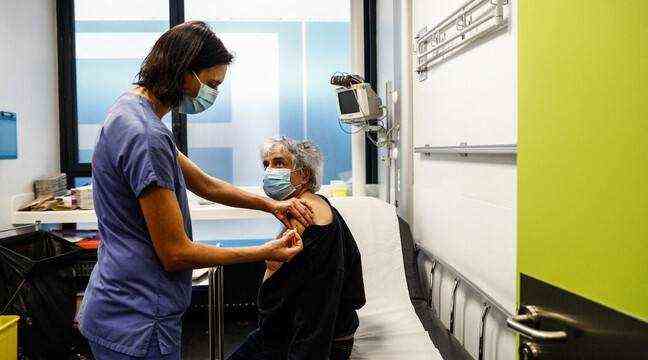On Monday, the Haute Autorité de Santé (HAS) recommended setting up a “reactive” vaccination strategy in the face of the most dangerous variants of the coronavirus, such as the Delta variant, estimated 60% more contagious than the Alpha variant, itself. even 50 to 74% more transmissible than the original strain of Covid-19.
Reactive vaccination consists of vaccinating “very quickly” the entire entourage of each positive case for a worrying variant as soon as the latter is identified. By entourage, the HAS refers to “all the individuals in the household of the detected case, people at their place of work and / or at school / university”.
React, isn’t it already too late?
The strategy can leave you with a skeptic at first impression. What is the point of vaccinating relatives when the person is already positive, and the vaccine requires two doses (excluding Jansen) with an interval of several weeks followed by another two weeks to offer maximum immunity? In fact, although not perfect, the first dose offers the onset of immune protection after twelve days. A very partial protection, far from being sufficient for you to stop applying the barrier measures after your first dose, but which – in this case – is always better than nothing. Thus, if a double dose of messenger RNA vaccine (Pfizer-BioNtech / Moderna) protects 90% against the risks of hospitalization, the first dose still protects at 30%, and also reduces the risk of catch the Delta variant. If a first dose is not sufficient (we allow ourselves to insist), it is not useless for all that.
Very good, but if this first dose is only effective after twelve days, what is the interest for those around a positive case? As a reminder, an individual is generally contagious between five and fifteen days after his contagion. And again, this means that he will have tested positive as soon as he caught the virus. In the more probable hypothesis that he was tested after having contracted symptoms, his peak of contagion has already passed (it generally occurs two days before the first symptoms, and the individual is no longer contagious between seven and ten days after their onset). Suffice to say that if the infected individual has contracted the virus, he will have transmitted it before the effect of the primary vaccination occurs in his relatives.
Break transmission chains
It is in particular because of these coronavirus incubation times that the HAS does not recommend a ring strategy, which consists of vaccinating contact cases and their own contact cases. Due to the incubation period of the virus (approximately five days) compared to the duration of the onset of the onset of vaccine protection (approximately twelve days after the first dose), the time for protection to begin is already too late for the contact cases of the already contaminated contact cases.
No profit then? Well, yes, because we must not forget the contaminations by rebound. “The strategy aims above all to avoid a second generation of cases of contamination since indeed we will probably not be able to prevent those among the” contacts “who are already infected from developing an infection”, notes Marie-Paule Kieny, virologist, vaccinologist and French public health expert.
Let’s take an example. Martin, Laurie, Stéphanie and Julien work in the same company. Martin tested positive for the Delta variant after the first symptoms appeared. As a result, Laurie, Stéphanie and Julien get vaccinated. AJ + 12, so they have a beginning of immunity. Unfortunately, it is too late for Laurie, who did not know it but was infected by Martin the day before her test. Too late also for Stéphanie, who was contaminated by Laurie in turn. For this chain of transmission there, in fact, vaccination was unnecessary. But now, on D + 13, Stéphanie, who still doesn’t know that she is positive, takes a coffee break with Julien. While without the first injection, Julien would have been contaminated in turn, the first dose protects him enough to avoid infection. Thanks to the reactive strategy, the chain of contamination stops at Stéphanie, whereas without everyone’s primary vaccination, Julien would have been contaminated and could in turn have infected other people. These are the rebounds that the reactive strategy intends to avoid.
In Search of Lost Time
An effective strategy? Opinions differ. For Marie-Paule Kieny, “from the moment we intervened very quickly, it is a very effective strategy. It interrupts the person-to-person transmission chains ”. Eric Billy, researcher in immuno-oncology, is more skeptical: “We must not lose sight of the fact that vaccination is above all prevention, and not therapy. Once a cluster is detected, it is often too late for those around it. And the primary vaccination offers, even twelve days later, only very partial protection. Vaccination is not a “reaction”, it is an anticipation “.
For the researcher, we must therefore push first and foremost towards more primary vaccination even before a positive case is detected. “People must be vaccinated, and health authorities must think about how to fight against the decline in primary vaccinations,” points out Eric Billy. Same message for the doctor and vaccinator Christian Lehmann: “We made people believe that vaccination could wait until the holidays or even back to school, but now is the time to get vaccinated as much as possible. The Delta variant is already present throughout the territory. We must therefore vaccinate, vaccinate, vaccinate. “More than reactive vaccination, the time has come for very active vaccination.

